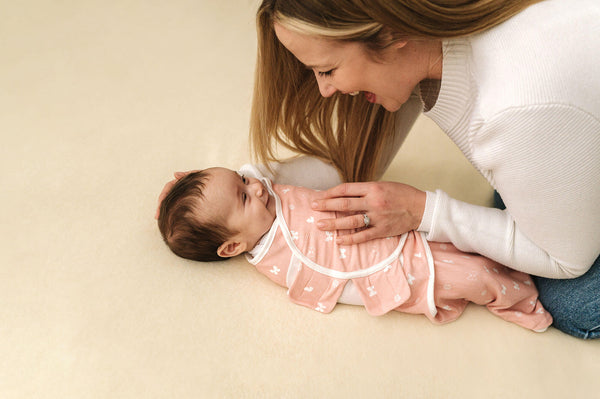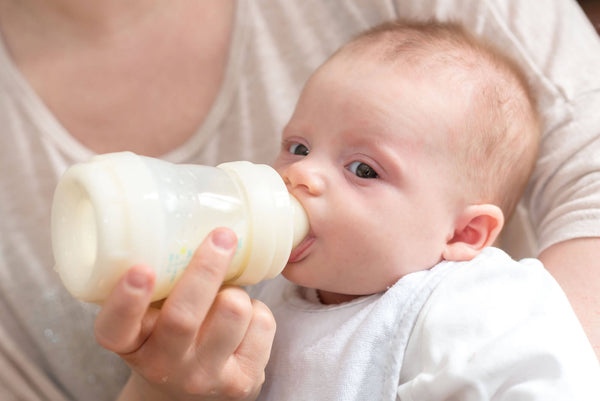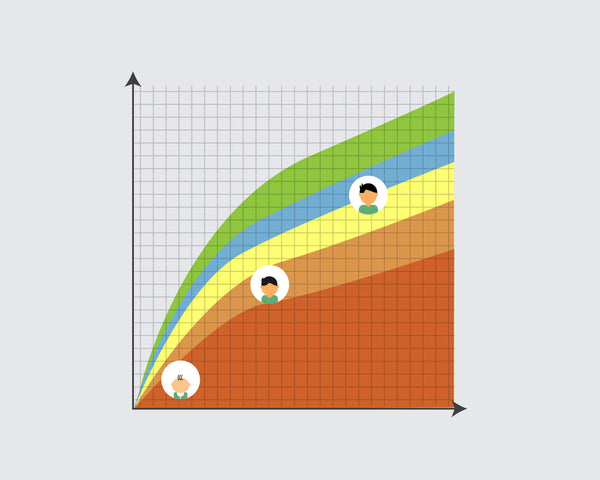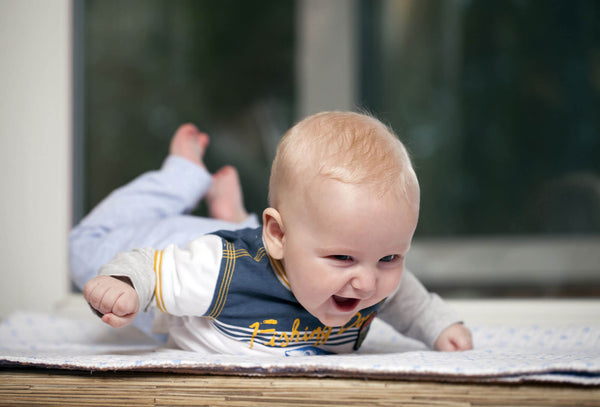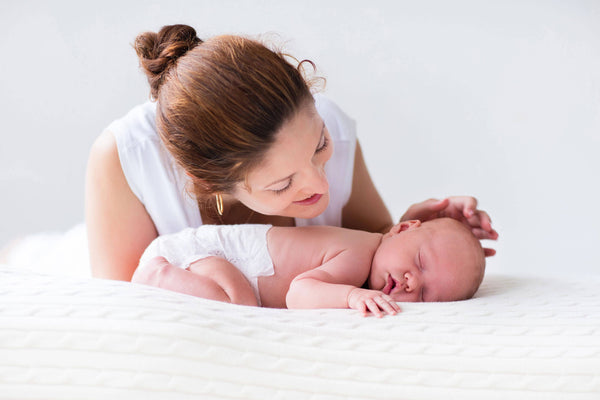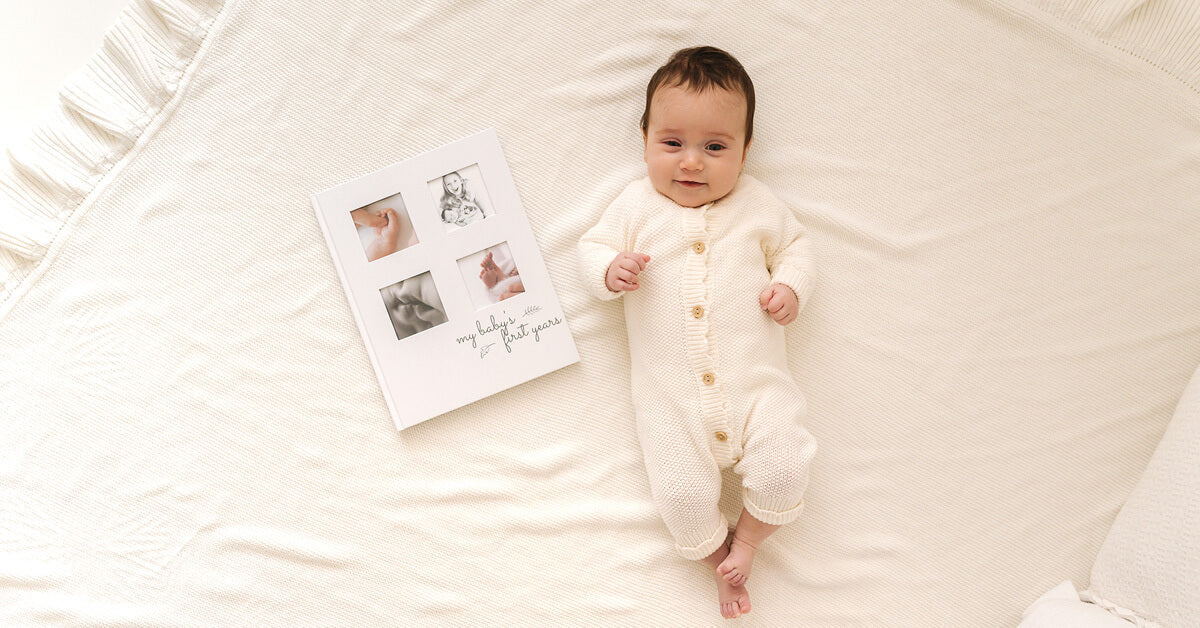
Your 1-Month-Old Baby: Development, Milestones, and Growth
You've made it to the one-month mark of parenthood - what's in store for your little one in terms of baby development? Newborns are taking in so much of the world around them. Read on to learn more about the development of young babies.
Babies grow so fast. When you have a newborn, it might seem like all they do is eat, sleep, and soil diapers. However, even at a young age, your baby's brain is developing rapidly. By the end of a baby's first few weeks, they'll be much more alert and learn to respond to their caregivers' voices and scents. Over time, your baby will move in more coordinated motions, and even pick up skills like moving their hand to their mouth. Read on to stay up-to-date on all the growth and milestones your baby will experience at about one month old.
What are the developmental milestones for my baby?
Oftentimes parents wonder when their baby will achieve certain skills, master a new concept, grow well beyond their birth weight, and become more interactive and expressive.
By 1 month old, your baby will have learned many new things and grown significantly.
How do developmental milestones track my baby's growth during their first year?
Pediatricians look at developmental milestones as a way to track each baby's growth and development throughout their first year of life. Research shows that most babies meet certain milestones at fairly specific ages (although it is perfectly normal for a baby's development to differ from the "norm" sometimes), and doctors can use these milestones to keep your baby healthy and strong.
One-Month-Old Baby Milestones, By Category:
Your little one will experience many milestones before they reach their first birthday. Here are some of the milestones they will accomplish around one month old.
Your Baby's Movement Milestones
Your baby's body will become more coordinated over time, but around one month of age, your baby might make jerky, quivering arm movements. You might see your baby's head move from side to side when they are lying on their belly. Your baby might be able to bring their hands close to their eyes and mouth. Your little one might ball their hands into tight fists.
Newborns lack the neck muscles to have strong head control, so you will notice their head flops backward if left unsupported by your hands or a baby carrier. You will need to take care to always support your baby's back and neck when holding them.
Newborn reflexes are strong, especially in the weeks following birth. Babies have strong reflex movements, like the startle reflex, where an infant flings their arms out to the side when they are startled by noise or movement.
Your Baby's Vision and Hearing Milestones
A one-month-old baby can focus on objects about 8-12 inches away from their body. Everything beyond that is blurry. Their eyes wander and your baby might go cross-eyed occasionally. This usually isn't cause for concern.
Infants prefer black and white or high-contrast patterns and pictures. Consider grabbing a book or two from the library that are specially designed for newborn development. Babies also respond to bright light.
Babies in the first few months prefer human faces over other objects. They will soon learn to recognize their caregivers and siblings over strangers.
A newborn's hearing is fully mature. They might recognize sounds - especially their parents' voices. They might turn their head to face familiar voices and sounds. Loud noise will startle them.
Your Baby's Smell and Touch Milestones
Your baby is born with a strong sense of smell. This reflex is especially helpful for breastfed babies, who will move their mouth toward the mother's breast. Babies prefer sweet smells as newborns, and avoid bitter smells.
Newborns know the scent of their mom's breast milk. This is helpful for your little one in gaining weight. When they recognize the mother's scent and the scent of her milk, they can more easily nurse on demand.
In terms of sense of touch, newborns prefer soft surfaces to course or rough sensations. Your newborn will love to snuggle up in a warm, fuzzy receiving blanket or swaddle wrap. Your baby will have a dislike for rough movements or abrupt movements. Spend time observing how your baby responds to different forms of touch.
Wearing your baby in a carrier is a great way to bond and keep baby close to you. Babywearing can help a new parent feel their baby close to them, and it helps the baby learn their parents' movements, language, scents, and much more.
1-Month-Old Baby Sleep
Newborns sleep a lot - up to 12-16 hours in a 24-hour period. By the time you have a one-month-old, your little one may have figured out the difference between day and night, and begin to sleep longer stretches at night.
Newborns need regular feeding around the clock, which explains why they sleep in short periods. A newborn baby's sleep cycle is typically 20-50 minutes long. At one month of age, breastfed and formula-fed babies will still wake up frequently throughout the night.
On average, a one-month-old baby will still wake up every 2-3 hours to eat at night. If your baby drinks breast milk, they might wake even more frequently. If you are concerned about your newborn's sleep, bring it up with your pediatrician at their next well-baby checkup.
Feeding Your 1-Month-Old Baby
As your baby grows, they might begin taking in more milk during feedings. Newborns typically eat every 2-4 hours. Babies who drink formula might eat on a more regular schedule than a breastfed baby who eats on demand and can have more variation in their schedule.
Breastfed babies might eat more frequently.
Breast milk digests quickly, and babies who breastfeed usually take smaller, more frequent feedings throughout the day than babies who have formula.
One-month-old babies should have about 2-4 ounces of formula every 2-4 hours throughout the day and night, generally moving up to 4-6 ounces every 4 hours.
Your baby's healthcare provider will be able to best assess how your baby is growing. Gaining weight is a key part of your baby's health. Newborns tend to spit up a lot, so be sure to keep your baby upright after feedings!
Crying and Communication: Mom, I'm Bored (or Hungry)!
Babies cry for many reasons. They might be hungry, tired, bored, overstimulated, gassy, or uncomfortable. It can be difficult to figure out what they need!
A one-month-old can't communicate with words yet, so it's important for parents to know what to look for when their baby is crying. Typically, babies begin to cry when they are hungry or tired. If your baby is neither of those, check your baby's diaper area. Maybe they need a clean diaper, or are getting a diaper rash. Also, check whether your baby seems too hot or too cold in their outfit.
Babies also cry when they are bored or overstimulated. It is easy for young babies to get overwhelmed by their environment, so if your little one is getting worked up, try taking them to a quiet, darker area for a break. If they seem bored, try showing them a new toy, going on a walk outside, or singing them a new song.
What are the developmental health concerns for my baby?
If you are concerned about your baby's growth and development after reading through this list, consider alerting their pediatrician. Babies gain skills at their own pace, but these are typical milestones that babies will meet by around one month of age.
If by the end of your baby's first month, you notice these things, be sure to notify their doctor:
-
Poor latch/suction during feeding
-
Doesn't blink in response to being exposed to bright lights
-
Seems "stiff" in movements, not moving their arms and legs much
-
Doesn't focus on objects
-
Their jaw trembles, even when they're not crying
-
They don't respond or react to loud noise
-
They don't react to seeing or hearing parents or familiar family members
-
They don't seem to be taking in enough milk during feedings
Items You Will Need This Month
Understanding baby growth charts
Pediatricians use a growth chart to track a baby's weight and height over time. Your little one's healthcare provider will show you how your baby's growth lines up on their growth "curve," and how your infant compares to other babies at the same age. These growth charts give a good look at how your baby is developing during their early months of life.
Growth charts are often done for length, weight, and head circumference.
Growth and Physical Development: Chubby Cheeks
Some babies grow faster than other babies, and that's okay! When babies surpass their birth weight, the pace at which they continue to grow varies widely.
After the first month, you might notice your baby gaining weight rapidly. From birth to one month of age, most babies gain about 2 pounds. That's a lot in a short amount of time!
On average, baby boys weigh about 9-10 pounds at one-month-old. The average length for baby boys at one-month-old is about 21-22 inches. The average for baby girls at this age is 9-10 pounds, and about 21 inches in length. Of course, this can vary!
All babies grow at different places, and just because one baby is bigger than another, doesn't mean they are any healthier. Some babies struggle with feeding and sleeping, and take more time to catch up to other infants their age. Some babies seem to gain slowly but then experience rapid growth spurts.
Your pediatrician will be the best judge of your little one's growth and development, including their weight gain.
Activities for Supporting Your 1-Month-Old Baby's Development
What can you do with a 1-month-old? It might not seem like you can "play" with a 1-month-old baby, but there are so many great activities you can do together to stimulate their physical and emotional development at this stage!
Eyes on That Rattle
If you want a fun activity to do with your little one, grab a rattle or musical toy and get your baby's attention. Encourage your 1-month-old to follow the object with their head or eyes, practicing their muscle control and vision.
Dance Party
At 1 month old, your baby is great at hearing things. Many babies love listening to soft music, so turn on your favorite jams, and have a dance party. You can hold your baby or wear them in an infant carrier, and gently move to the beat of the music. This is a fun, simple way to bond with your baby and encourage their sense of hearing.
Story Time: Practicing Facial Expressions
Next time you read a story to your baby, have them face you so they can see your facial expressions as you read. Babies love looking at faces, and even at 1-month-old, your little one can begin to understand visual cues and facial expressions.
Reading to your baby is a great way to boost their baby development milestones, and exposing them to the power of the human face is the perfect way to encourage their emotional development and social development.
1-Month-Old Baby Care Basics
As your little one grows, it can become easier to care for their needs. Newborn babies need to eat frequently, so parents should try their best to create a good feeding schedule that works for their family.
Sleep is also essential for newborns, and having a safe sleep space is very important! Your 1-month-old should sleep in their own bassinet or crib (without crib bumpers or other loose objects). Your baby should not sleep with a pillow, stuffed animal, or blanket (unless it is used to swaddle them).
Tummy time is more than just an aspect of infant playtime. Tummy time helps your 1-month-old build muscle and coordination that is necessary for helping them hold up their head and not fall backward if you don't support their head and neck when holding them.
Take your baby out to get fresh air as much as you can! Just because young babies don't really "do" much just yet, they can still enjoy being outside and getting some sunlight! Outdoor time is a great way to enjoy spending time with your baby and allowing them to experience new sights, smells, and sounds.
Contact your baby's healthcare provider to book all well-baby appointments, and bring up any questions about any skills or other milestones you are concerned about.
What are safety tips for my 1-month-old baby?
-
Keep your one-month-old's sleep space away from dangerous objects, and keep their bed free from blankets, pillows, stuffed animals, receiving blankets, toys, and crib bumpers.
-
Only swaddle your baby until they show signs of rolling.
-
Make sure your baby sleeps on a firm mattress designed for infants.
-
Make sure to use properly installed car seats whenever you take your baby in the car.
-
If you are breastfeeding, make sure you pay attention to any food sensitivity your baby might have. For example, if your baby has a cow's milk protein reaction, this will often show up in your baby's poop. Contact your healthcare provider with any concerns about your breastfed baby reacting to foods that you eat.
One-month-olds are so much fun!
There are so many ways to care for and bond with your newborn baby. From playing peek-a-boo, to encouraging tummy time, to reading and singing, it's so amazing to watch your baby's progress, even when they are still brand new to the world.
|
|
Meet Our KeaMommy Contributor: Kaitlyn Torrez I’m Kaitlyn Torrez, from the San Francisco Bay Area. I live with my husband and two children, Roman and Logan. I’m a former preschool teacher, currently enjoying being a stay at home mom. I love all things writing, coffee, and chocolate. In my free time, I enjoy reading, blogging, and working out. |












































